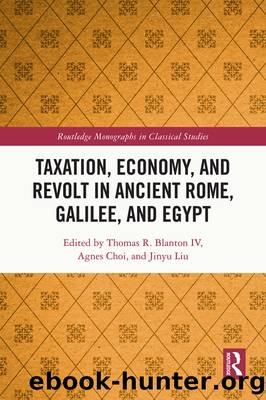Taxation, Economy, and Revolt in Ancient Rome, Galilee, and Egypt by Thomas R. Blanton IV;Agnes Choi;Jinyu Liu;

Author:Thomas R. Blanton IV;Agnes Choi;Jinyu Liu; [Liu;, Thomas R. Blanton IV;Agnes Choi;Jinyu]
Language: eng
Format: epub
ISBN: 9780367472207
Publisher: TaylorFrancis
Published: 2022-03-30T00:00:00+00:00
Mark is our earliest witness to the Synoptic tradition of Jesusâs famous âreturn to Caesarâ teaching and the source of the other versions. In Markâs account, the Herodians and Pharisees acknowledge that Jesus does not regard people with partiality before asking him, âIs it lawful to give kÄnsos to Caesar, or not?â The verb exestin, meaning âit is lawful,â is often used to distinguish what is lawful for one person but not another, as in a letter in which Artemis of Karanis requests a legal representative âbecause it is not lawful [ouk exesti] for a woman to engage in a lawsuit without a legal representativeâ (P.Mich. VIII 507 [second/third cent. CE]; my trans.). As we have seen, women, minors, and certain high-status individuals were not legally required to pay poll taxes.
The Latin loanword kÄnsos here must refer to taxes collected on the basis of census declarations, but specifically taxes collected in coin, since Jesus asks his interlocutors to bring him a denarius. As Zeichmann (2017b) has argued, in Markâs post-70 CE context, this could refer not only to a poll tax but also to the Jewish tax.18 For the Markan author and earliest audiences, kÄnsos may have encompassed the punitive tax levied on Jews. By validating the payment of census taxes, the Markan Jesus assented to an institution that normalized partiality. In this light, his clever response (âReturn to Caesar the things that are Caesarâs, and to God the things that are Godâsâ) is cast as successful because Jesus does not show partiality that conflicted with census regulations. To those being taxed as Ioudaioi in Markâs audience, this might not have been satisfying. Perhaps, however, some would have taken solace in Jesusâs implication that Caesar is not God, which undermines the oath taken in census declarations.19
Matthewâs version of this teaching changes very little, though it is more explicit that the denarius is the âcoin of the kÄnsos.â Earlier in his gospel, however, Matthean âspecial materialâ (i.e., material that only appears in the Gospel of Matthew among the gospels) primes readers to think of the kÄnsos in terms of the Jewish tax (Matt 17:24â27):
When they reached Capernaum, the collectors of the didrachma came to Peter and said, âDoes your teacher not pay the didrachma?â 25 He said, âYes, he does.â And when he came home, Jesus spoke of it first, asking, âWhat do you think, Simon? From whom do kings of the earth take tolls or kÄnsos? From their children or from others?â 26 When Peter said, âFrom others,â Jesus said to him, âThen the children are free. 27 However, so that we do not give offense to them, go to the sea and cast a hook; take the first fish that comes up; and when you open its mouth, you will find a coin; take that and give it to them for you and me.â
á¼Î»Î¸á½¹Î½ÏÏν δὲ αá½Ïῶν Îµá¼°Ï ÎαÏαÏναοὺμ ÏÏοÏá¿Î»Î¸Î¿Î½ οἱ Ïá½° δίδÏαÏμα λαμβάνονÏÎµÏ Ïá¿· Î á½³ÏÏῳ καὶ εἶÏαν· ὠδιδάÏÎºÎ±Î»Î¿Ï á½Î¼á¿¶Î½ οὠÏελεῠ[Ïá½°] δίδÏαÏμα; 25 λέγει· ναί. καὶ á¼Î»Î¸á½¹Î½Ïα
Download
This site does not store any files on its server. We only index and link to content provided by other sites. Please contact the content providers to delete copyright contents if any and email us, we'll remove relevant links or contents immediately.
| Central Africa | East Africa |
| North Africa | Southern Africa |
| West Africa | Algeria |
| Egypt | Ethiopia |
| Kenya | Nigeria |
| South Africa | Sudan |
| Zimbabwe |
Goodbye Paradise(3455)
Men at Arms by Terry Pratchett(2685)
Tobruk by Peter Fitzsimons(2376)
Arabs by Eugene Rogan(2196)
Pirate Alley by Terry McKnight(2128)
Borders by unknow(2119)
Belonging by Unknown(1732)
It's Our Turn to Eat by Michela Wrong(1593)
The Biafra Story by Frederick Forsyth(1560)
Botswana--Culture Smart! by Michael Main(1484)
The Source by James A. Michener(1459)
A Winter in Arabia by Freya Stark(1447)
Gandhi by Ramachandra Guha(1433)
Coffee: From Bean to Barista by Robert W. Thurston(1420)
Livingstone by Tim Jeal(1394)
The Falls by Unknown(1372)
The Shield and The Sword by Ernle Bradford(1312)
Africa: Altered States, Ordinary Miracles by Richard Dowden(1296)
Egyptian Mythology A Fascinating Guide to Understanding the Gods, Goddesses, Monsters, and Mortals (Greek Mythology - Norse Mythology - Egyptian Mythology) by Matt Clayton(1278)
